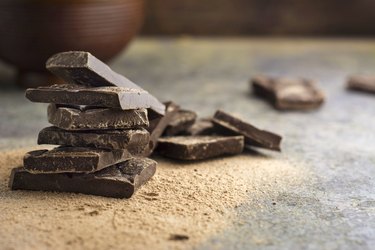
Outside of coffee, you'll find caffeine in all types of foods including some teas, sodas and even chocolate products. If you're trying to reduce or eliminate caffeine from your diet, it might be a good idea to look at how much chocolate you're eating.
Caffeine is naturally occurring in cocoa, so chocolate made from cocoa (aka true chocolate) will always have some caffeine. There are some caffeine-free and low-caffeine options, but they may not be true chocolate.
Video of the Day
Video of the Day
How Much Caffeine Is in Chocolate?
The caffeine content in chocolate varies. It comes down to the amount of cocoa solids used to make the chocolate.
The percentages of cocoa solids in the three main types of chocolate are as follows, according to the National Institute of General Medical Sciences:
- Dark chocolate: 35 percent or more cocoa solids
- Milk chocolate: 20 to 30 percent cocoa solids
- White chocolate: 0 percent cocoa solids
This correlates to the amount of caffeine in chocolate. Chocolate that's made with more cocoa solids will have more caffeine.
Dark chocolate has the most caffeine because it's made with more cocoa solids than milk or white chocolate. A 1-ounce serving of dark chocolate with 45 to 59 percent cocoa solids has about 12 milligrams of caffeine, according to the USDA. Up the cocoa solids in your dark chocolate to 70 to 85 percent, and the caffeine increases to 23 milligrams per serving, per the USDA.
Milk chocolate has less caffeine: A 1-ounce serving contains about 5.7 milligrams of caffeine, according to the USDA.
To put this into perspective, an 8-ounce cup of coffee has around 96 milligrams of caffeine, and most adults can safely drink up to 400 milligrams of caffeine per day, according to the Mayo Clinic.
Chocolate has much less caffeine than coffee, but it can add up quickly depending on the portion size. You might also want to avoid eating chocolate at night if you have trouble sleeping.
Caffeine in Chocolate (per 1-ounce serving)
Caffeine Content | |
|---|---|
Dark Chocolate (35% cocoa or more) | around 12 to 23 mg |
Milk Chocolate (20-30% cocoa) | around 6 mg |
White Chocolate (0% cocoa) | 0 mg |
Does White Chocolate Have Caffeine?
White chocolate does not have caffeine because it's made without cocoa solids. Instead of cocoa solids, white chocolate is usually made of cocoa butter, sugar and milk, according to the Harvard T.H. Chan School of Public Health.
There's some debate as to whether or not white chocolate is actually chocolate because of the lack of cocoa. Nevertheless, white chocolate is reported to have 0 milligrams of caffeine, per the USDA.
What About Caffeine-Free Chocolate?
If a chocolate bar is made with cocoa, you can bet that it has some caffeine. True caffeine-free chocolate from cocoa beans doesn't exist, but there are some alternatives.
Imitation chocolate bars made from carob or soy have no caffeine. That said, they also don't have any actual cocoa, so they aren't really "chocolate" bars in the strictest sense.
Similarly, white chocolate is made using cocoa butter, not cocoa solids. That means it doesn't have caffeine.
If you're trying to take in less caffeine, stick to milk chocolate or white chocolate.
- CDC: "Get the Facts: Added Sugars"
- National Institute of General Medical Sciences: “The Chemistry of Chocolate”
- USDA: "Chocolate, dark, 45- 59% cacao solids"
- USDA: "Chocolate, dark, 70-85% cacao solids"
- MyFoodData: "Milk Chocolate"
- MyFoodData: "White Chocolate"
- Mayo Clinic: "Artificial sweeteners and other sugar substitutes"
- Mayo Clinic: "Caffeine content for coffee, tea, soda and more"
- Harvard T.H. Chan School of Public Health: “Dark Chocolate”